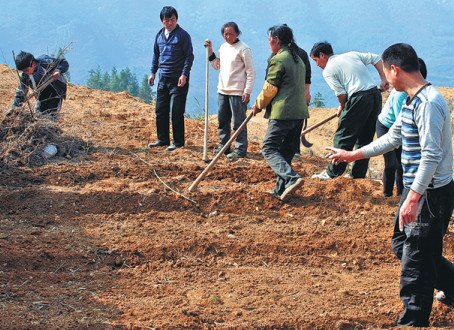
Workers in Tongren, Guizhou, plant herbs for use by traditional practitioners. (Photo/China Daily)
Growing potential
A number of publicly listed companies in Guizhou are now devoted to the research and production of Miao medicines.
Last year, Guizhou Bailing Group Pharmaceutical, one of the largest companies in the sector, registered total assets of nearly 4 billion yuan, according to its third-quarter report.
Wang's growing reputation on the internet and in media reports has resulted in a rise in patients from around China.
"Some patients even help me book flights and hotels so that I can go and see them in their homes," he said.
The growth of social media has also enabled him to conduct long-distance consultations before sending herbal medicines to patients via courier services.
Last year, Wang saw more than 3,000 patients, and more than 40 percent of the consultations were conducted on WeChat.
Changes ahead
Despite the growing popularity of traditional Miao remedies, many practitioners said the lack of certification and procedures to check credentials mean the sector is vulnerable to fraud, which could tarnish its image.
Moreover, the fact that many practitioners live deep in the mountains and have received little formal education makes it difficult for the authorities to oversee their activities.
Under Chinese law, doctors are only allowed to treat patients after they have passed the relevant exams, and they must also obtain licenses from local health authorities to treat patients in their jurisdictions.
"Many herbal practitioners have treated patients in their villages for decades, and they have won the trust of people from near and far. However, they have never been licensed," said Ma Jun, a doctor at the administration office of Miao herbal medicine at the Kaili Hospital of Chinese Medicine in Guizhou.
According to Ma, unlike modern Western treatments or traditional Chinese medicines, Miao herbal medicine does not have a systematic method of evaluating practitioners.


















































